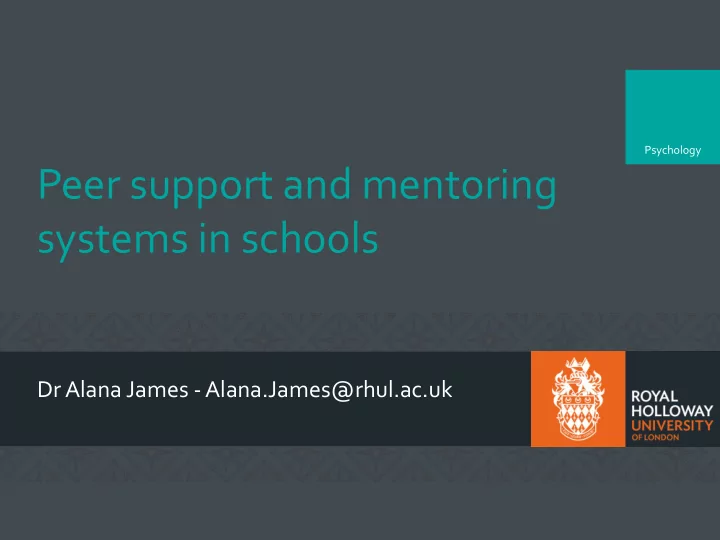

Psychology Peer support and mentoring systems in schools Dr Alana James - Alana.James@rhul.ac.uk
What is peer support? Psychology “a range of activities and systems within which people’s potential to be helpful to one another can be fostered through appropriate training .” – Cowie & Smith (2010) Befriending Mediation Mentoring
Use of peer support and mentoring Psychology Houlston, Smith & Jessel (2009): estimated 62% UK schools - Primary schools - befriending and mediation - Secondary schools - mentoring and befriending - Aim to benefit: Target pupils; Peer supporters; Whole school Interventions - Academic support - Mental health and social-emotional support e.g. bullying - Part of systemic approaches
Peer listening example Sarah’s old friends She went to see a Peer Supporter, a I’m glad I went to the Peer were sending her pupil who was trained to help… Supporter. The bullying has I feel really scared and threatening text stopped and I can have fun alone at school now. messages… with my new friends. What’s happening sounds serious. It needs to stop. You’re right. I just don’t know what to do. I can come with you to tell a teacher, and you could try joining a club to meet new friends.
Pathways to impact: target pupils Psychology Pupil users Peer supporters Directly access help – one-off or Experience of providing help sustained support May be helped to access support Training and CV experience from adults Skills development Positive interactions with peers Positive interactions with peers and staff E.g. Cowie et al., 2002; Ellis et al., 2009; Smith & Watson, 2004
Pathways to impact: whole school Psychology School climate Bullying Promote positive citizenship Emotional support for victims Improve pupil-pupil and pupil- Direct intervention – peer staff relationships mediators or staff Change school values Fostering caring and safer school environment Prevent problems escalating E.g. Houlston & Smith, 2009; Menesini et al., 2012; Salmivalli, 2001
Evidence overview Psychology Student users: Majority report scheme helpful Largely self-report evidence but advances in certain domains Peer supporters: Self-report increased social skills Measured advances in social/emotional development Whole school climate: Teachers and pupils report safer climate Little evidence bullying is reduced E.g. Cowie et al., 2002; Ellis et al., 2009; Houlston & Smith, 2009; Leung et al., 2013; Menesini et al., 2012; Salmivalli, 2001; Smith & Watson, 2004
Being a peer mentor
Peer mentoring: thematic analysis Psychology Peer supporters gain experience and skills through challenges of role
Developing a peer support system
Longitudinal case studies Psychology Two schools developing peer listening systems • School 1: 18 months; School 2: 6 months • Pastoral care and tackle bullying • Year 10 supporters • Year 7, 8 and 9 target users Pupil questionnaires Qualitative (possible sample of c.360 target pupils) (Smith&Watson, 2004) − Peer support knowledge, use, and − Peer supporters: focus groups − Pupil user/non-user: interviews attitudes (Smith&Watson, 2004) − Bullying experiences (ABA) − Staff co-ordinators: interviews − School climate perceptions (ABA) − Observation (informal) − School 2: Peer Supporters (Rosenberg Self-esteem Scale; SDQ; modified Conflict Tactics Scale)
Impact Psychology Student users Low use in both schools Helpful for vulnerable pupils c.50% pupils thought was a good idea Peer supporters Self-reported gains - Communication skills, peer relationships, CV experience Whole school climate Little impact on whole school environment Bullying reduced in 1 school
Implementation factors Psychology School One School Two Low use and peer supporter Low use and peer supporter frustration frustration Lack of management response Listening -> mentoring Hidden peer listening room Unclear mentee selection Gender imbalance Lack of confidentiality Low use -> need for adaptation - Need for match between aims, needs, and design Scope for impact limited by practical issues - Dedicated co-ordinators but need for management support
Supporting effective peer support
Questions to consider Psychology Peer support systems as interventions -What are the target outcome(s)? - How might peer support achieve change(s) - How will you know if it is successful? Identify practical factors -Where and when? -Who will be the mentors? Who would benefit from the role? Monitoring and adaptation - How will peer mentors be supervised? - How will you know if it is meeting pupil needs?
Thank you for listening Psychology Thanks to: Prof. Peter K. Smith (Goldsmiths, University of London) Prof. Lorraine Radford (University of Central Lancashire) Prof.Yuichi Toda (Osaka Kyoiku University) Prof. Keumjoo Kwak (Seoul National University) Prof. Shinji Kurihara (Hiroshima University) Key references: James, A. I., Smith, P. K., & Radford, L. (2014). Becoming grown-ups: a qualitative study of the experiences of peer mentors. Pastoral Care in Education. 32 (2), 104-115. Cowie, H. & James, A. I. (2016). Peer support in England, Japan and South Korea. In: Smith, P. K., Kwak, K. & Toda, Y. (Eds.) School Bullying in Different Cultures – Eastern and Western Perspectives , Cambridge University Press.
Recommend
More recommend